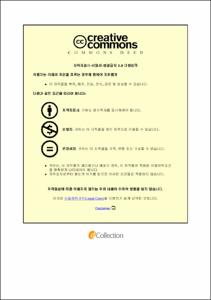상사의 비인격적 감독과 고객의 불량행동이 종사원들의 감정노동과 직무소진에 미치는 영향 (카지노종사자를 대상으로)
- Alternative Title
- The EffectofSuperior’s ImpersonalSupervising andCustomer’sMisbehavioronEmployee’sEmotionalLaborandJobBurnout
- Abstract
- The casino industry in Korea was licensed for the expansion of foreign exchange revenues on tourism income in the 1960s. Since then, 16 casinos exclusively for foreigners and 1 for Koreans have been operating at the moment. According to the Korea Casino Association, the domestic casino industry reported total sales of 2.9 trillion won in 2016 and the casino industry employs more than 9,000 people.
Despite such developments, casino dealers' emotional labor is 95.8%, higher than Hochschild's emotional labor standard(40%)(Kim Jong-jin, 2013). Casino open 24 hours a day and chip is a concept like money, so casino employees experience followed by a customer's frequent changes of mood and pain of speaking ill. As a result of meritocracy system, high–roller is a direct correlation with casino sales. This is another example of emotional labor different from the emotional labor felt by customers' misbehavior. As such, casino employees have dual emotions due to characteristic of job, and double expressions affect job burnout, so they need to be managed efficiently.
Therefore, casino employees want to determine the impact(difference) of influence on the exhaustion of tasks by using emotional labor as a medium by the effect of superior's impersonal supervising and customer's misbehavior in the course of the work.
In the research, a literature review and survey were performed, and casino employees from casino in Korea–including Paradise casino and Pusan Branches of Grand Korea Leisure–were recruited. The survey was a total of 140 questionnaire papers were distributed and 130 of them were used for analysis. The collected data went through a data coding and data cleaning process and were analyzed with SPSS v. 22.0 statistical package program.
The result of the empirical analysis is summarized as follows:
First, it was confirmed that the effect of superior's impersonal supervising and customers' misbehavior had a positive(+) effect on emotional labor for casino employees.
Second, it was confirmed that emotional labor had a positive(+) effect on job burnout for casino employees.
Third, it was confirmed that the effect of superior's impersonal supervising had a positive(+) effect on job burnout for casino employees. But it was confirmed that the effect of customer's misbehavior had a not positive effect on job burnout for casino employees.
Fourth, as a result of a mediated regression analysis of the emotional labor between the effect of superior's impersonal supervising, customer's misbehavior, and job burnout. Emotional labor served as a partial–mediated parameter between the effect of superior's impersonal supervising and job burnout.
AS a result, it was revealed to casino employees that the effect of superior's impersonal supervising and customer's misbehavior have a positive(+) effect on emotional labor. And it was confirmed that emotional labor have a positive(+) effect on job burnout. But it was confirmed that the effect of customer's misbehavior had a not directly positive effect on job burnout.
The point that is different from the existing preceding was that the study Comparative analysis was conducted the scope of study on emotional labor to internal and from external member.
As a result, it was confirmed that the effect of superior's impersonal supervising had more influence on the exhaustion of duties by using emotional labor as a parameter than customers' misbehavior.
Key words : the effect of superior's impersonal supervising,
customer's misbehavior, emotional labor, job burnout
- Issued Date
- 2018
- Awarded Date
- 2018.2
- Type
- Dissertation
- Keyword
- 감정노동 직무소진 상사의 비인격적 감독 고객 불량행동
- Publisher
- 부경대학교
- Alternative Author(s)
- Lee yuna
- Affiliation
- 부경대학교 경영대학원
- Department
- 경영대학원 관광경영학과
- Advisor
- 전재균
- Table Of Contents
- ABSTRACT ⅴ
1.서 론 1
1.1.연구의 배경 및 목적 1
1.1.1.연구의 배경 1
1.1.2.연구의 목적 3
1.2.연구의 구성 및 방법 4
1.2.1.연구의 구성 4
1.2.2.연구의 방법 5
2.이론적 배경 6
2.1.카지노 산업 6
2.1.1.카지노 산업의 배경 6
2.1.2.카지노 산업의 현황과 발전과정 7
2.2.고객 불량행동 10
2.3.상사의 비인격적 감독 12
2.4.감정노동 14
2.5.직무소진 17
3.연구 설계와 분석방법 19
3.1.연구모형 및 연구가설의 도출 19
3.1.1.연구모형의 설계 19
3.1.2.연구가설 20
3.2.변수의 조작적 정의와 설문지 구성 23
3.2.1.변수의 조작적 정의 23
3.2.2.설문지 구성 26
3.3.자료의 수집 및 분석방법 28
3.3.1.자료의 수집 28
3.3.2.자료의 분석방법 29
4.실증분석 30
4.1.표본의 특성 30
4.2.신뢰성 및 타당성 분석 32
4.3.연구가설 검증 34
4.3.1.상관관계 검증 34
4.3.2.가설검증 35
4.3.3.가설검증 결과 42
5.결 론 43
5.1.연구결과의 요약 43
5.2.연구결과의 한계점 및 향후 연구방향 46
- Degree
- Master
- Files in This Item:
-
-
Download
 상사의 비인격적 감독과 고객의 불량행동이 종사원들의 감정노동과 직무소진에 미치는 영향 (카지노종사자를 대상으로).pdf
기타 데이터 / 963.8 kB / Adobe PDF
상사의 비인격적 감독과 고객의 불량행동이 종사원들의 감정노동과 직무소진에 미치는 영향 (카지노종사자를 대상으로).pdf
기타 데이터 / 963.8 kB / Adobe PDF
-
Items in Repository are protected by copyright, with all rights reserved, unless otherwise indicated.